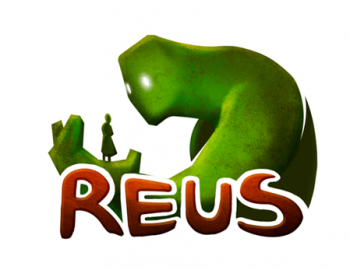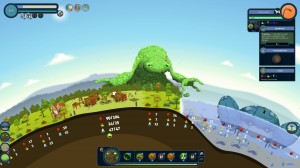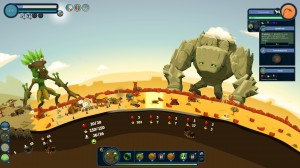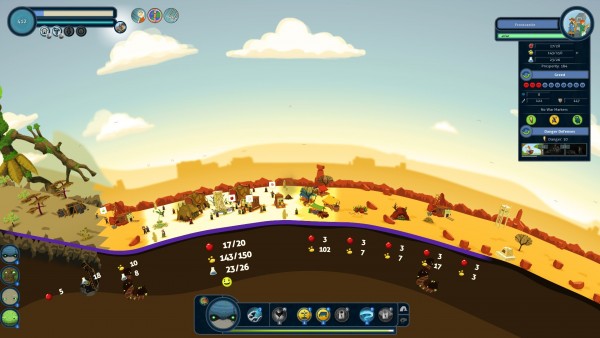
Reus is an interesting little god game that came out recently. Since I enjoy god games, I decided to pick it up, and I was not disappointed. Behind the cute, aesthetic and deceptively simple interface is a surprisingly deep game that will suck hours out of your day.
The premise of Reus is that you are mother earth, in command of four giants: the Rock Giant, Swamp Giant, Ocean Giant and Forest Giant. Your goal is to foster and build human civilization through the interaction of these Giants and their powers.
When you start a new game, you go through The Beginning mode. Here, through three Eras, you are taught the basics of how to manipulate the world, attract settlers and grow your community. Once you complete this tutorial, you are then presented with Era mode, where the main game lies. Here you progress from 30-minute game modes to 60-minutes to 120-minutes as you unlock developments, such as building certain projects or reaching a certain population goal. There is also a freestyle mode where you can play as long as you want, but you will not gain any achievements.
What is surprisingly compelling about Reus is how its simplicity leads to some pretty deep choices in regards to how you terraform and build your civilization. For instance, if you want a desert civilization you will need to create a mountain which spawns desert tiles next to it. However, if there is an ocean nearby and the mountain is not directly next to it, you will have forest tiles popping up instead. Plants and animals have certain synergies that can only be applied when next to a specific organism. For example, snakes give out additional gold if they are next to smaller animals. To add, the various resources can also be upgraded, or transmuted as the game calls it, to new and different resources; for instance, stone can be transmuted into salt or copper, each giving different resources. These transmutations are only possible through completing projects set out by villages. How it works is that depending on the villages (there are three types: desert, forest and swamp), each gives their own ambassador, which in turn unlocks specific abilities for each of your giants. Certain abilities even require multiple types of ambassadors, but Giants cannot have a monopoly on them so it is going to take some stratagem on your part to decide how you want to develop your villages.
The villages themselves add another layer to the game. If they get too greedy, they may start attacking other villages. You can prevent this by either easing up on how many resources you give them, or increasing their danger level through planting dangerous animals in their territory. The former is tricky because if you do not handle their concerns they may turn on you and start attacking the Giants. The latter requires some caution as well, for if you increase their threat too much, the village will slowly die off. Some projects even ask you to destroy other villages using your Giants’ powers, which lead to the conundrum of whether the end justifies the means, depending on how developed the targeted village is and whether you had another development to achieve in mind.
Reus, in the end, is a very charming and addictive god game, and at under $10, it is practically a steal. If you are in the mood to be a world of your own, do not hesitate to pick up Reus.
















